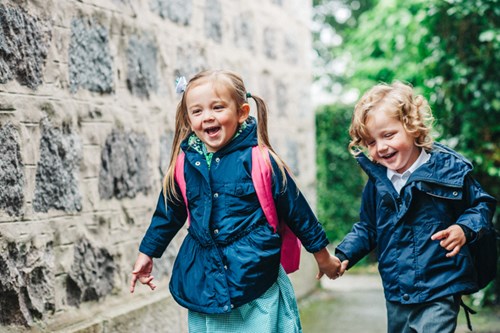17/08/2017 | Natalie Jewitt
A new exciting chapter

Starting school is a big transition for both you and your child so it is totally normal for it to be met with a mixed bag of emotions. I write this particular blog with both my psychologist and mummy head on, as my little girl is also starting school this year. Writing this has been a good opportunity to remind myself of all the things I discuss in my work, whilst sharing my top tips with you all. I’m hugely excited for her, I can’t wait to hear all about it when she comes home, but I’m also feeling sad that our time together each day will be less and I can recognise that I feel some anxiety which is likely due to the uncertainty of how she will find it all. So I write this for you and me as we enter this new exciting chapter together:
- In the days leading up to your son or daughter starting school, talk to them about what a typical school day may look like. There are lots of great books now available that can help you to do this. Ask your child how they are feeling about starting school, and if they have anything they want to chat to you about. Try to avoid saying things like “You don’t need to worry about that” at this can shut down the conversation, instead follow their lead and say “thanks for sharing that with me ...” Really hear what they have to say and always start by acknowledging their feelings, before thinking together about what you can do to help.
- It can be helpful for children to have pictures of the school, teachers and any friends they may already have made in the peer group before starting school. This helps them to feel more comfortable when they arrive on their first few days as they will recognise the building, classroom and a few faces. Most schools will have pictures on their website; have a look together.
- It will help your child feel more confident if they can go to the toilet independently, put their coat/shoes on and off and get changed for PE. Make it as easy as possible for them by buying shoes with Velcro on if your child cannot tie their laces and a coat that is easy for them to get on and off and practice at home. However, don’t panic if they haven’t quite mastered one or two of these, especially for some of the younger ones. A lot of developing goes on between 4 and 5 years and it may take some a little longer to master these skills. It may be helpful to send a note in to their class teacher to let them know that your little one needs some help with x, but that you are practicing with them at home.
- Help your child to feel confident and independent at lunch time by ensuring that they can open all cartons and containers in their lunch box and close them again if necessary. Practice with them peeling fruit if this is provided at snack time. Keep their lunches to things they are familiar with at first as there are lots of new things for them to take in, its good for lunch to be familiar and something you know they like.
- Work towards having a relaxed morning before school. Try to make sure that there isn’t a big rush to get ready for school. To help with this prepare clothes, lunches, bags and anything else they need the night before. This will help reduce any anxiety your child may have about starting school and will keep everyone calmer and happier – including you. To get them involved you could make a simple picture list for your children with what they need to do to be ready for school that they can then tick off each day.
- On their first few mornings if they are feeling a little anxious, let them know that this is totally normal. Talk to them about times when you may have started something new and how you felt. Let them know how you managed this, maybe through deep breathing, talking to a friend, going for a walk etc and then help them think of strategies they may find useful to help them relax. Do a simple breathing activity where you both get some bubbles, breathe in slowly through your nose and then blow out slowly through your bubble wand, blowing lots of bubbles everywhere. Try shaking the anxiety off together, by doing silly dances around the living room, great for getting rid of the build up of adrenaline but also a great playful activity that will get them laughing which also eases the anxiety feelings. For more tips and strategies join us on one of our children and anxiety workshops where we talk a lot more about anxiety and how to empower your children. Book now by going to our events page.
- Talk through what will happen on those first few drop offs to help them know what to expect, this will help them manage the initial separation, which can be the hardest but for many children.. For example, “When we get to school, I will come in with you and we can find your coat peg together, then I will walk into your class to have a quick look where you will be, I will then give you a kiss say goodbye and I will go". I find it can be helpful for some children to know a few key steps throughout the day to help with their sense of time so if they ask when you will be coming back say something like “then you will have the register, play and learn then lunch time then some more playing and learning then I will pick you up again” can be helpful.
- At the beginning make your days without them sound a bit dull, so your child doesn’t think they are missing out. If they are missing you whilst at school sometimes a small hanky with your perfume/aftershave on may help comfort them or another small transitional object. Some kids may have a little picture in their bag that helps them feel more connected to you throughout the day. Most schools will be fine with this if it helps your child and they keep it in their pocket or bag. If in doubt just send them a quick email so they know why your child has it.
- Being an active part of a class group is demanding on young children, don’t be surprised if they let off a bit of steam in the hours after school finishes. A tantrum, meltdown or tearful outburst is perfectly normal as they adjust to their new routine. To help them to wind down after school make sure you have healthy snacks and a drink available straight away, comfy clothes for them to change into and even some wind down activities such as building, colouring or even getting outside in the garden for some free play. Keep in mind that it is common for children to hold all their emotions in whilst at school and then when they feel safe, secure and comfortable at home with you they release it all. Be there, help them name their feelings and let them know that you are there to support them.
- Young children need lots of sleep, especially in the early days of a new school term; you will probably notice they will be more tired than usual when they start school. If possible try to get them in a good routine before school starts and keep to it whenever possible. If your child is feeling anxious we know that feeling tired, hungry or unwell can all make anxiety harder to deal with. Children need fuel to be ready for their school day. Encourage your child to eat a good, healthy breakfast and send a snack in their bag for their morning break.
- If like me you are also feeling some anxiety, be carefully this doesn’t rub off on to your child. Children are great at picking up on your feelings, especially those who are prone to feelings of anxiety themselves. It is important that you have another outlet for those feelings and find some good support for you. Of course letting our children know that we will miss them when they start school, but are really excited too is fine...I would just say be careful about your worries becoming theirs. Try and be upbeat with discussions about school.
- The school transition for many goes well and after you both get into a new routine you can sail along relatively smoothly, for some the path may be a little bumpier. If you reach some difficulties good communication with your child’s school is really important. If you feel your child is struggling get in touch with them early on and see what additional support is available.
If you feel you and your child may benefit from some additional support from our service then do get in touch to arrange a free telephone discussion.
If you have any questions or thoughts email me at natalie.jewitt@jenbys.co.uk.
Thanks for reading and enjoy watching your child learn, grow and shine!
Natalie

Article written by:
Dr Natalie Jewitt, CPsychol, BSc (Hons) DClin Psych

